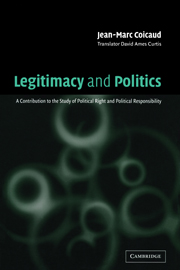Book contents
- Frontmatter
- Contents
- Translator's foreword
- Acknowledgements
- Introduction
- 1 What is political legitimacy?
- 2 Controversies around political legitimacy
- 3 Modernity, rationality of the social sciences, and legitimacy
- 4 Social sciences, historicity, and truth
- 5 Study of politics, relation to history, and de jure judgement
- 6 Community experience, dynamic of possibilities, and political legitimacy
- Conclusion
- Bibliography
- Index
2 - Controversies around political legitimacy
Published online by Cambridge University Press: 22 September 2009
- Frontmatter
- Contents
- Translator's foreword
- Acknowledgements
- Introduction
- 1 What is political legitimacy?
- 2 Controversies around political legitimacy
- 3 Modernity, rationality of the social sciences, and legitimacy
- 4 Social sciences, historicity, and truth
- 5 Study of politics, relation to history, and de jure judgement
- 6 Community experience, dynamic of possibilities, and political legitimacy
- Conclusion
- Bibliography
- Index
Summary
The analysis of political life, when conducted from the standpoint of legitimacy, goes against some theses that are judged to be self-evident. Interpreted as belonging to the very birthright of the social sciences, these theses are not always considered in their full detail and often exist in a diffuse and vulgarised way within political thought. In this regard, the problematic of legitimacy developed in the present work goes against two major tendencies.
The first of these tendencies consists in the affirmation that legitimacy, as previously defined, is extraneous to political reality. The second has to do with methodological disputes resulting from the way in which legitimacy is conceived. These two tendencies are obviously not independent of each other. They overlap on many points.
In any case, the questions they raise are serious enough for it to be necessary to account for them. And above all, in parallel with this need, we have to shed some light on their limitations and their contradictions.
POLITICAL REALITY AND LEGITIMACY
To explicate the conditions of possibility for a legitimate relation between governors and governed is to account for an aspect that, even if it does not characterise political reality in full, occupies therein a position of the first rank. This portion of reality, which is manifested in legitimacy, is contested by certain analyses in which it is stated that the right to govern stands in radical contradiction to how political life actually operates.
- Type
- Chapter
- Information
- Legitimacy and PoliticsA Contribution to the Study of Political Right and Political Responsibility, pp. 43 - 96Publisher: Cambridge University PressPrint publication year: 2002



